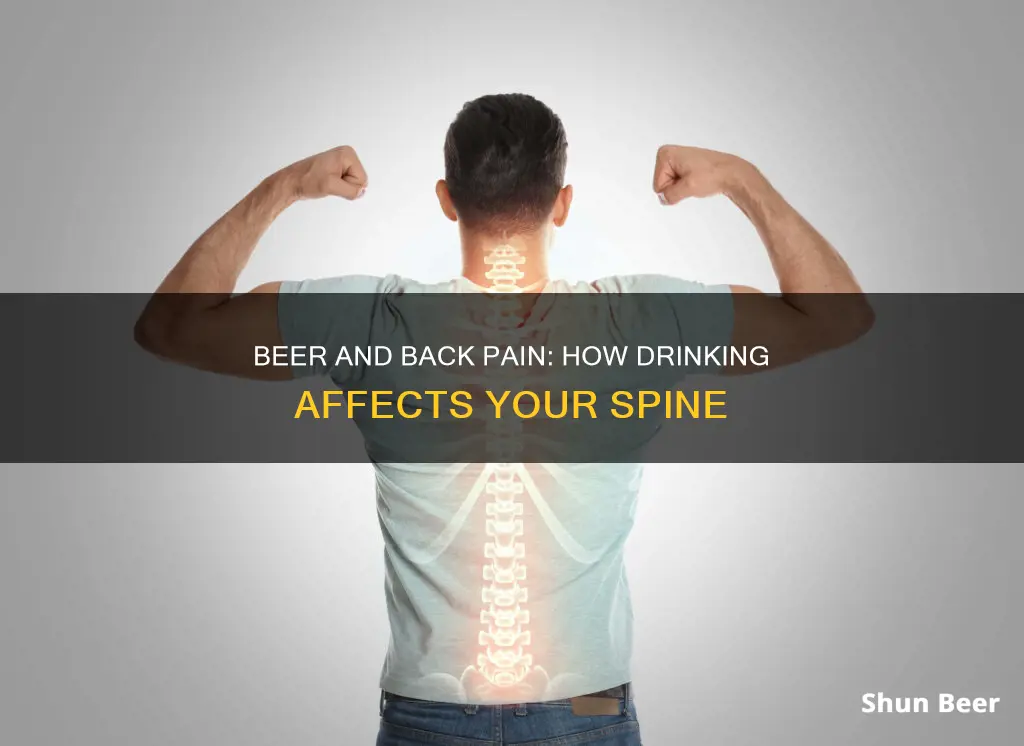
Alcohol is often associated with several health issues, and excessive drinking can have a significant impact on the body. While moderate drinking is generally considered healthy and may even offer some benefits, heavy drinking can lead to various problems, including an increased risk of liver and kidney damage. One aspect that is not often discussed is the effect of alcohol on the spine. So, what does drinking beer or any alcoholic beverage do to your spine?
| Characteristics | Values |
|---|---|
| Dehydration | Alcohol blocks the creation of vasopressin from the pituitary gland, reducing the amount of water in the body. This can cause dehydration and reduce the amount of water in the intervertebral discs, leading to pain from discs rubbing together or pressing on nerves around the spine. |
| Increased Risk of Injury | Alcohol reduces inhibitions and coordination, increasing the likelihood of accidents and spinal cord injuries. |
| Muscle Relaxation | Alcohol can act as a muscle relaxant, leading to less support for the back and neck, and potentially increasing discomfort. |
| Weight Gain | Drinking large amounts of beer and other alcoholic beverages can cause weight gain, especially around the abdomen, placing unnecessary pressure on the spine. |
| Nerve Damage | Heavy drinking increases the risk of alcoholic neuropathy, a type of nerve damage associated with muscle weakness and a "pins and needles" sensation. |
| Joint Pain | Alcohol can increase the risk of joint pain and contribute to chronic back pain. |
| Arthritis | While alcohol has anti-inflammatory effects that may reduce the risk of rheumatoid arthritis, the quantity required for these benefits is less than one glass of wine per day. |
What You'll Learn

Alcohol's impact on spinal cord injury risk
Alcohol consumption can have a detrimental impact on spinal health and increase the risk of spinal cord injuries. While moderate drinking is generally considered safe and can even offer some health benefits, heavy drinking or binge drinking can lead to various issues that negatively affect the spine.
One of the main ways alcohol contributes to spinal problems is by causing dehydration. The spinal cord requires adequate hydration to cushion the discs and prevent injuries or slipped discs. Chronic dehydration from excessive alcohol consumption can, over time, strain the spine and make it more susceptible to injuries.
Alcohol also reduces inhibitions and impairs coordination, increasing the likelihood of accidents. This is a significant risk factor for spinal cord injuries, as accidents are a common cause of such injuries. Additionally, alcohol can act as a muscle relaxant, leading to reduced support for the back and neck, which can exacerbate existing spine issues and increase discomfort.
Research has also linked alcohol consumption to an increased risk of cervical spinal cord injuries specifically. A study found that individuals with cervical injuries were more likely to have been drinking alcohol at the time of their traumatic injury compared to those without cervical injuries. This finding highlights the role of alcohol in increasing the risk of certain types of spinal cord injuries.
Furthermore, heavy drinking is associated with nerve damage and can lead to alcoholic neuropathy, which can cause muscle weakness and a "pins and needles" sensation. Alcohol is toxic to nerve cells and can affect the nerves surrounding the structures in the back and neck. This can further increase the risk of spinal cord injuries and exacerbate existing spine conditions.
It is important to note that the impact of alcohol on spinal cord injury risk is complex and can vary from person to person. However, excessive alcohol consumption can negatively affect spinal health and increase the likelihood of spinal cord injuries, especially when combined with other risk factors such as engaging in risky activities or having an existing spine condition.
Swiss Beer: What's Brewing in Switzerland?
You may want to see also

Dehydration and its effects on the spine
Dehydration can have a significant impact on the spine and back pain. The spinal discs, which act as shock absorbers and prevent vertebrae from pressing on nerves in and around the spinal column, require adequate hydration to function properly. These discs are filled with a gel-like substance that is composed of almost 75% water. When the body is dehydrated, the amount of fluid in these discs is reduced, causing them to become smaller and less effective at cushioning the vertebrae. This can lead to increased pressure on the spine, resulting in pain and discomfort.
The effects of dehydration on the spinal discs can cause a range of issues, including:
- Insufficient support for the spine, leading to pain and discomfort.
- Swelling of the spine, which can further aggravate the surrounding nerves and tissues.
- Herniated discs, where the discs bulge outwards and put pressure on the vertebrae.
- Reduced range of motion, making it difficult to bend, lift, or pivot.
- Stiffness and pain in the back and neck, which may radiate down the legs or arms.
- Conditions such as osteoarthritis, disc herniation, and spinal stenosis.
Chronic dehydration, often caused by excessive alcohol consumption, can lead to long-term issues with spinal health. Alcohol blocks the creation of vasopressin, an antidiuretic hormone that helps regulate water levels in the body. This leads to increased urination and subsequent dehydration, putting a strain on the spine.
To maintain spinal health, it is crucial to stay properly hydrated by consuming adequate water and fluids throughout the day. Additionally, it is important to be mindful of alcohol consumption, as excessive drinking can contribute to dehydration and negatively impact spinal health over time.
Drinking and Driving: One Beer, Safe to Drive?
You may want to see also

Alcohol's role in accidents and potential spinal injuries
Alcohol consumption can have a detrimental impact on spinal health and increase the risk of accidents, which may result in spinal injuries. While moderate drinking is generally not considered harmful, heavy drinking or binge drinking can lead to several issues that affect the spine.
Firstly, alcohol is a diuretic, meaning it increases fluid loss and can lead to dehydration. This dehydration can impact the spinal discs, which act as shock absorbers between the vertebrae. Dehydration can cause these discs to lose water content, leading to increased friction and discomfort. In addition, dehydration can affect muscle function, making them more susceptible to injury.
Secondly, alcohol can impair coordination and increase the likelihood of accidents. This is especially concerning when combined with activities such as driving, sports, or even walking down stairs. Spinal cord injuries are often associated with traumatic accidents, and alcohol use is a risk factor for such injuries. Studies have shown that individuals are more likely to engage in risky behaviours when under the influence of alcohol, such as speeding or not wearing seatbelts, which can increase the severity of accidents.
Thirdly, alcohol can affect pain perception and increase pain tolerance. While this may seem like a positive effect, it can lead to further damage to the spine. With a higher pain tolerance, individuals may be more likely to lift heavy objects or make abnormal movements that can aggravate existing spinal issues or lead to new injuries.
Additionally, heavy drinking is associated with weight gain, particularly around the abdomen. This can place unnecessary pressure on the spine and contribute to back pain. Alcohol is also linked to an increased risk of nerve damage, which can affect the nerves surrounding the spinal structures and lead to muscle weakness and sensory issues.
While the relationship between alcohol consumption and spinal health is complex, it is clear that excessive alcohol intake can increase the risk of accidents and potential spinal injuries. It can also exacerbate existing spinal conditions or make them more difficult to manage. Therefore, maintaining a healthy lifestyle with moderate or no alcohol consumption is generally recommended for individuals experiencing back pain or spinal issues.
Beer Drinking: Healthy Habit or Harmful Vice?
You may want to see also

Alcohol's influence on muscle relaxation and support
Alcohol can have both relaxing and detrimental effects on the muscles and spine. While moderate drinking is generally considered safe and can even have some health benefits, heavy drinking can lead to muscle weakness and increased risk of injury.
Alcohol can act as a muscle relaxant, which may be perceived as desirable for those experiencing muscle tension or pain. However, this relaxation comes at a cost. When the core muscles that support the spine are relaxed due to alcohol consumption, it can lead to decreased support for the back and neck, potentially increasing discomfort. This is especially true for individuals already living with neck or back issues.
In addition, alcohol consumption can cause dehydration, which can impact the spinal cord and intervertebral discs. These discs act as shock absorbers between the vertebrae, preventing pain caused by discs rubbing together or pressing on nerves. Dehydration due to alcohol can reduce the water content in these discs, leading to increased friction and nerve compression, resulting in back pain.
The dehydrating effects of alcohol also impact the kidneys, which need to filter significant amounts of water to break down alcohol. If the body is dehydrated, the kidneys will draw water from the muscles, leading to muscle dehydration and weakness. This can further contribute to a lack of support for the spine and increase the risk of injury.
While moderate drinking may not significantly affect back pain, heavy drinking or binge drinking can be detrimental. The more alcohol a person consumes, the higher their tolerance for pain tends to become. This reduced responsiveness to pain signals can lead to a higher chance of sustaining muscle or tendon damage and aggravating existing neck or back pain.
Furthermore, alcohol can lower inhibitions, leading to riskier behaviour such as lifting heavy objects or making abnormal movements that can result in spinal injuries. Alcohol abuse is also associated with an increased level of inflammation throughout the body and has been linked to chronic back pain.
In conclusion, while alcohol may provide some muscle relaxation, its overall effects on the body, including dehydration, inflammation, and reduced inhibitions, can lead to decreased support for the spine and increased risk of injury. Therefore, it is essential to consume alcohol in moderation and be aware of its potential impacts on muscle relaxation and spinal support.
Beer and Steroids: Safe Mix?
You may want to see also

Alcohol-related weight gain and its effect on the spine
Alcohol-related weight gain can have a significant impact on the spine. Drinking large quantities of beer and other alcoholic beverages tends to cause weight gain, especially around the abdomen. This additional weight places unnecessary pressure on the spine, which can lead to back pain and discomfort.
Alcoholic drinks are often referred to as containing "empty" calories, providing the body with calories but very few nutrients. For example, a 12-ounce can of beer contains approximately 155 calories, while a 5-ounce glass of red wine contains around 125 calories. These extra calories can contribute to weight gain, especially when consumed in excess.
When alcohol is consumed, it is burned by the body as a primary source of fuel before glucose from carbohydrates or lipids from fats. This can lead to excess glucose and lipids being stored as adipose tissue or fat. The excess consumption of alcohol can also turn into fat in the liver and increase fat levels in the blood, which is more likely to be stored as body fat.
In addition to weight gain, alcohol consumption can also relax the core muscles, leading to less support for the back and neck. This reduced support can increase discomfort for individuals with existing neck or back issues. Furthermore, alcohol can lower inhibitions, leading to poor decision-making and increased risk of accidents, which may result in spinal cord injuries.
Chronic dehydration caused by excessive alcohol consumption can also impact the spine. The spinal cord requires adequate hydration to cushion the discs and prevent injuries or slipped discs. Therefore, consistent binge drinking and chronic dehydration can pose issues for spine health in the long term.
Beer Drinking: Life Shortener or Not?
You may want to see also
Frequently asked questions
Drinking beer can cause dehydration, which puts a strain on your spine as the spinal cord requires adequate hydration to cushion your discs and prevent injury. Beer also contains empty calories, which can lead to weight gain and put unnecessary pressure on the spine. Excessive drinking can also lead to accidents, which may result in spinal cord injuries.
Alcohol blocks the creation of vasopressin from the pituitary gland. This antidiuretic hormone helps control the amount of water in your body. When you drink alcohol, your body secretes more water in your urine, causing dehydration.
Drinking beer can cause weight gain, especially around the abdomen. This extra weight puts pressure on the spine and can lead to back pain.
Alcohol reduces inhibitions and coordination, increasing the likelihood of accidents such as falls, sports injuries, or vehicle crashes. These accidents can result in serious spinal cord injuries.







